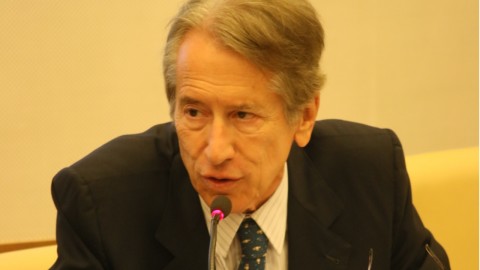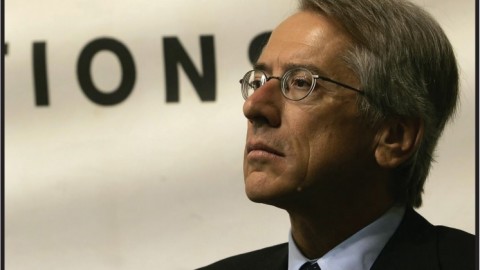Johannesburg, May 4th, 2015
Your Eminence Wilfrid Cardinal Napier,
Consul General of Italy Gabriele Di Muzio,
Mrs. Daniela Taiocchi, Author of the wonderful book “Vuoti a rendere”,”Emptied for Filling”,
Chairman of Little Eden Mr. Maurizio Galimberti, and Chief Executive Officer Mrs. Lucy Slaviero
Distinguished Guests,
It is a high honour for me to share with you the emotion of this great day at Little Eden.
As Minister of Foreign Affairs and as a Diplomat I had countless opportunities to witness millions of Italians all over the world sharing deep rooted values enshrined in our culture, our family education, and our Christian belief.
All over the world Italians prove every day how sensitive they are to other people’s suffering; showing compassion; helping the poor, the most destitute, those in need, so close to the heart of Mother Teresa of Calcutta.
How could these values, embedded in our identity, be underestimated for Italy’s role in the international arena? They are the “lode star” of the Italian foreign policy.
Echoing Filippo Mazzei’s suggestion to Thomas Jefferson, the 1776 American Declaration of Independence began with this sentence: “We hold these truths to be self evident, that all human beings are created equal, that they are endowed by their Creator with certain unalienable Rights, that among these are Life, Liberty and the pursuit of Happiness” .
Almost two Centuries later, in 1948, the Universal Declaration of Human Rights emphasized the very same principle in its incipit: “All human beings are born free and equal in dignity and rights… Everyone has the right to life, liberty and security of person”.
During my term as head of the Italian Diplomacy I kept the sentence suggested by Phil Mazzei to Thomas Jefferson, not only as a logo on my websites and social media; but I did all I could in order to give full substance to a “value driven” italian foreign policy.
Freedom of religion and belief, Rule of Law, non discrimination for all without distinction of any kind, abolition of capital punishment, have become constant features in many Italian initiatives undertaken both in multilateral organizations and in bilateral diplomacy.
It is true that for Government Officials, as for ordinary citizens and individuals, it is all but easy to speak up and take action to protect the weakest, to support political and social integration of the disenfranchised, to actively defend human rights.
It is especially true in time of crises: when we face massive violations of human dignity; when we see persecutions of religious and ethnic minorities; when entire States fail, civil coexistence is disrupted, migrants are abused and exploited.
In such circumstances it may be all but easy to take side. However, the “Righteous” who rescued so many during the Holocaust have proven that those who have faith, and enough will to engage, can make enormous difference.
A wide number of legal instruments is now days emerging in the international community for the so called “Single-Issue Human Rights Regime”. A Regime increasingly represented by the UN, the Organization for European Security and Cooperation, the International Labour Organization and others. In quite different geopolitical realities there is clearly a growing perception that Minority rigths should be protected; Slave trade and Slavery eliminated; Workers’ Rights implemented; that Genocide and Crimes against Humanity must be punished; that Racial Discrimination has to be everywhere abolished; that Women and Children Rights adequately protected, and Rights of Persons with Disabilities fully recognized.
These patterns belong to a long process toward higher international standards for human rights, sustained and made possible by the unwavering commitment of very special people. Among them, we a remember and admire an housewife from Albenza, Bergamo, mother of six children, Domitilla Rota Hyams, who at a certain moment of her life decided that she had to take care of young kids with severe disabilities.
The courage of individuals who help those in need often contaminates bystanders and persons otherwise indifferent to compassion. Thanks to this courage our public awareness is accrued and can be translated into Governments action.
Could we consider a mere coincidence that Little Eden opened its doors to black children long before the fight against the Apartheid was won? Or that Domitilla showed her interest in helping kids with disabilities fifty years before the 2006 Convention on the Rights of Persons with Disabilities? Or that Little Eden became a pioneer organization in caring for intellectual disabilities, excelling in management and fund raising strategies, and in promoting volunteer programs and international cooperation?
Domitilla Rota Hyams and her husband Danny were people of extraordinary vision. True, she was also described as a person “with a dogged determination and unshakable faith in God’s divine purpose”. Her commitment made a big difference not only for more than a thousand children assisted and supported at Little Eden. It did also anticipate and reinforced, in many ways, the impressive evolution of the South African society towards the recognition of equality and dignity for all.
When His Eminence accepted last year the invitation to the Santuario Della Madonna Della Cornabusa and addressed members of Bergamo’s religious and civil society about South Africa’ celebration of twenty years of Democracy, Cardinal Napier reflected on the impact and influence of the Church on bringing the two opposing parties together, ending segregation by race. The message of Love and Mercy that Domitilla and Danny Hyams were sending from Little Eden during the Apartheid was certainly heard by many.
That same message also brings us again to Bergamo and to Rome.
A month ago, on April, 4th, the Holy Father celebrated Mass in St. Peter’s Basilica on the occasion of the Octave of Easter and Devine Mercy Sunday.
In his homily Pope Francis said: “To us also, on this Sunday that Saint John Paul II wished to dedicate to Devine Mercy, the Lord shows us, through the Gospel, his wounds. They are the wounds of Mercy. It is true: the wounds of Jesus are the wounds of mercy. He invites us to enter into the mystery of those wounds, which is the mystery of his merciful love”.
It may be a sign of the Providence that Domitilla and Danny Hyams met and then started their journey together from the same cultural and spiritual environment which had shaped the mission of Saint John XXIII.
Albenza sits on a hill overlooking Sotto il Monte, just a couple of miles from the village that Giuseppe Roncalli was keen on visiting every summer until he became Pope, to stay with his beloved family.
It was therefore in Sotto il Monte and in Bergamo, where Monsignor Giuseppe Roncalli opened at the end of WWI a “Student House” for the spiritual needs of young people, that this young theology Professor became profoundly aware that the Church must prefer “the balm of mercy to the arm of severity”, that Truth is essential and must be communicated with “merciful love”, that both truth and mercy are necessary. In fact, Roncalli called himself “a teacher of mercy and truth”.
No surprise, therefore, that in the years preceding the Vatican Council Pope John XXIII stressed in every possible way the need for mercy. He published the Encyclical Paenitentiam Agere on the gift of God’ mercy and the need for us to recognize it.
As we all know Saint John XXIII, had enormous influence in shaping the conscience of a time marked by the decolonisation, the Anti-Apartheid Movement, campaigns for Civil Rights. At the same time in his Encyclicals he emphasized the right of the man to be looked after in case of ill health and disability.
All along their journey from Albenza to Little Eden Domitilla and Danny Hyams
did prove that the teaching and the example of this great Pope and great Saint from Bergamo could be wonderfully reflected in their own life, trough their courageous commitment, by helping the others.
 wikipedia
wikipedia
